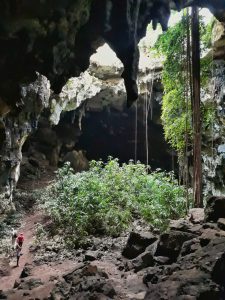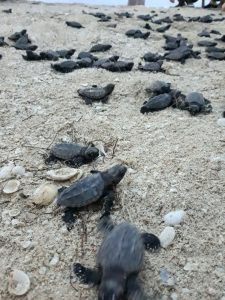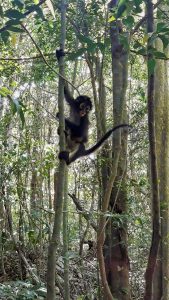By Katrina Rossos
Kelly San Antonio, a senior studying wildlife ecology and conservation, recently traveled to Mexico and participated in a study abroad program entitled “UF in Mérida – Tropical Ecology and Spanish.” San Antonio is currently interested in studying large-scale distribution patterns and spatial ecology and how they relate to environmental factors. Hailing from Port Orange, Florida, San Antonio grew up with a passion for the outdoors and idolized naturalists and conservationists such as David Attenborough, Jane Goodall, and Steve Irwin.

“Never did I think that was a viable career until I ended up working for an FWC-run summer camp between my freshman and sophomore year, which reignited my passion for wildlife and natural resources,” San Antonio said. “By the end of my sophomore year, I had switched over to the wildlife ecology and conservation major and am beyond grateful that I can follow in the footsteps of my role models.”
She found out about “UF in Mérida – Tropical Ecology and Spanish” from the bi-annual study abroad fair held on campus, where she met geology professor Mark Brenner, the leader of the program. To travel to Mexico, San Antonio received the Gilman Scholarship, a grant that’s offered by the U.S. Department of State to encourage international study.

“I was determined to study abroad because I wanted first-hand experience of what international field work would be like if I incorporated it into my future career,” San Antonio explained. “Excusing my prior naivety, I learned that international field work has its difficulties and, while it is a struggle at times, is something I can make happen if I want to expand my interests of international conservation.”
San Antonio describes Mérida as a “giant, bustling city full of Mayan and colonial heritage.” She stayed in the city with a local family from Monday through Wednesday and took Spanish and ecology classes. Then, from Thursday through Sunday, she traveled with her group throughout the Yucatán Peninsula. The group ventured to an array of subtropical forests, marine sanctuaries, ancient ruins, and Mayan pueblitos.
San Antonio’s favorite day on the trip actually involved some feces. The group traveled to Punta Laguna, a nature reserve located outside of Tulum, Quintana Roo. This reserve, nestled next to the Cobá archaeological site, is renowned for its spider monkeys. The group swam in the area’s blue lagoon and then split into smaller groups to travel with nature guides into the jungle. San Antonio spotted spider monkeys quickly after the hike began, and the group continued to approach an area of open water.

“Our guide motioned for us to freeze as two spider monkeys swung into view and perched right above us – a mother and her baby. The baby was inquisitive and ran around us while the mother watched, a little more used to humans, and even reached out her arm to our guide,” San Antonio noted. “That moment was almost like Michelangelo’s, ‘The Creation of Adam,’ and I was completely mesmerized by this interaction between human and primate. Later on, we saw larger troops of monkeys and even had a barrage of attacks directed at us – thrown sticks, loud vocalizations, and an array of defecation. It was one of my best memories from the entire trip.”
While traveling throughout Mexico, San Antonio said that she better understood the united effort of conservation and realized how similar she was to the citizens of Mexico. “The people of the Yucatán have an intense passion for conservation and national pride for their wildlife and natural resources, even if their conservation tools or management techniques may differ from ours,” San Antonio said. “Mexico is our neighbor and I think many people can become disillusioned about this country by stereotypes or media portrayal, which these typecasts, from my experience, proved wrong in almost every way. I came to Mexico to learn about wildlife but the biggest lesson I gained was about people.”
 0
0
